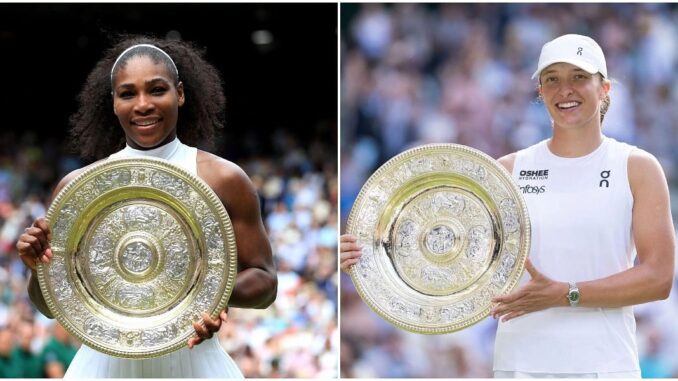
The world of tennis is constantly evolving, with new stars emerging to challenge the legacies of the sport’s greatest. In a fascinating recent commentary, Rick Macci, a renowned American coach who played a pivotal role in the early development of Serena and Venus Williams, offered a thought-provoking distinction between Iga Swiatek and Serena Williams, two dominant figures of the 21st century. Macci posited that while Iga Swiatek stands as “the most accomplished player in the 21st century,” Serena Williams remains “the greatest player since the start of 2000.” This nuanced assessment has ignited considerable debate among tennis enthusiasts, highlighting the subtle differences in how we define success and impact in the sport.
Macci, known for his forthright opinions and deep insights into the game, shared his perspective on a recent platform, drawing parallels and contrasts between his former prodigy, Serena, a winner of 23 Grand Slam singles championships, and the formidable Iga Swiatek, who has now amassed six major titles, including a recent Wimbledon triumph in 2025. “Iga is the most accomplished player in the 21st century,” Macci stated, before adding, “Serena is the greatest player since the start of 2000.” He concluded by acknowledging their shared elite status: “Both special champions on and off the court. Both cut from the same championship cloth.”
The distinction Macci draws between “accomplished” and “greatest” is central to understanding his viewpoint. “Accomplished” often refers to a player’s accumulation of titles and milestones within a specific timeframe, in this case, the 21st century. Swiatek’s rapid rise, her remarkable 37-match winning streak in 2022, her consistent Grand Slam victories across different surfaces – including four French Open titles, one US Open, and now her inaugural Wimbledon crown in 2025 – certainly paint a picture of extraordinary achievement in a relatively short span. Her 100th major victory at Wimbledon, achieved in just 120 matches and seven years after her debut, puts her in an elite category alongside Serena Williams as one of the fastest to reach that milestone.
Serena Williams, on the other hand, began her professional career in the late 20th century, securing her first Grand Slam title at the 1999 US Open. However, the vast majority of her record-breaking 23 major singles titles, along with numerous doubles and Olympic gold medals, came after the year 2000. Her longevity, her ability to dominate across multiple generations of players, and her sheer transformative impact on the sport are what solidify her “greatest” status in Macci’s eyes. Williams’s power, athleticism, and unyielding competitive spirit redefined women’s tennis, elevating it to new levels of athleticism and entertainment.
Macci’s comments, however, have not been universally accepted. A section of the tennis fan base reacted strongly, pointing out that almost all of Serena Williams’s accomplishments also fall within the 21st century, making the distinction seem somewhat arbitrary to some. One fan’s retort perfectly encapsulated this sentiment: “Are 21st century and 2000+ not the same thing??? So you’re saying Iga has accomplished more than Serena? Because almost all of Serena’s accomplishments came in the 21st century.” Another fan highlighted Williams’s early career dominance: “Mind you, Serena had 7 singles slams (at all 4 tournaments), 6 doubles slams (at all 4 tournaments), 2 mixed doubles slams and a gold medal in doubles at the same age [as Swiatek].” These reactions underscore the strong opinions and passionate loyalties within the tennis community when comparing legends.
Despite the backlash, Macci’s statement forces a deeper consideration of how we evaluate players. Is it purely by the number of titles? By their influence on the game? Or by their peak performance over a defined period? Swiatek, at just 24 years old, has already carved out an incredibly impressive resume, demonstrating a level of consistency and versatility across surfaces that few players achieve. Her ability to win all six major finals she has competed in speaks volumes about her composure and killer instinct on the biggest stages.
Yet, Serena Williams’s legacy is built on not just statistics, but on cultural impact, overcoming adversity, and shattering numerous records while facing diverse challenges throughout a career spanning over two decades. Her narrative extends far beyond mere wins and losses, encompassing social justice advocacy and breaking barriers in sports.
Ultimately, Macci’s provocative distinction serves to celebrate both athletes. It recognizes Swiatek’s phenomenal achievements in the current era, acknowledging her as a true force within the 21st century. Simultaneously, it reaffirms Serena Williams’s unparalleled position as a transformative figure and the consensus “greatest” of her time, whose influence continues to resonate long after her retirement. Both players, in their unique ways, have undeniably left an indelible mark on the sport, proving themselves to be “special champions on and off the court,” indeed “cut from the same championship cloth” of excellence.
Leave a Reply